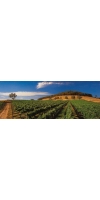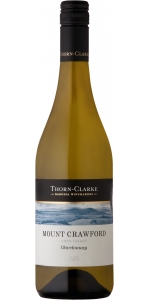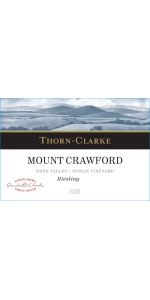Wine from Thorn Clarke - Mount Crawford

The Thorn Clarke Estate
The winery owners are David and Cheryl Clarke (born Thorn) and their son Sam is the manager of the winery. The Thorn-Clarke family has a long history in the Barossa - six generations of involvement in the region's world famous wine industry. The Thorns have been grape growers in the Barossa since the 1870's. David Clarke's passion for the wine industry lead to the planting of the Kabininge vineyard outside of Tanunda in 1987, which represents the start of a deeper involvement by the family in the Barossa wine industry.
The Thorn Clarke Vineyards
Eden Valley is one of Australia's oldest and most respected white wine regions, and within the Eden Valley the Mount Crawford block is recognized for its particularly cold climate. The cooler conditions of this sub-region, combined with nutrient-poor residual soils and a northern aspect, create an environment ideal for growing white grape varieties. Vines are restricted from growing too vigorously or ripening too quickly ensuring the grapes develop wonderful flavor and character.
Thorn Clarke Mount Crawford Chardonnay is made from 100 percent Chardonnay.
This Chardonnay is a fine example of Mount Crawford climate, soil and aspect combining to display great varietal characters. The light green color has a vibrancy that is characteristic of the wine. Peach and tropical fruit flavors are complemented by a creamy texture from lees contact and a small amount of exposure to French oak. This also gives the wine a rich, long but clean finish with delicious white peach, pear and citrus notes.
The winemaker recommends trying this wine with chicken teppanyaki.
This Thorn Clarke Mt. Crawford Riesling is a fine example of Mount Crawford climate, soil and aspect combining to display a varietal bouquet of spicy floral characters. With fresh, crisp citrus notes and a long finish on the palate, this wine can be enjoyed with a vast array of foods. The winemaker recommends enjoying this with spicy tandoori chicken.
This Thorn Clarke Mt. Crawford Riesling is a fine example of Mount Crawford climate, soil and aspect combining to display a varietal bouquet of spicy floral characters. With fresh, crisp citrus notes and a long finish on the palate, this wine can be enjoyed with a vast array of foods. The winemaker recommends enjoying this with spicy tandoori chicken.
- back
Selected Options
Wineries
Categories
Pricing
Countries
Regions
Grape Types
Wineries
Organic/Free Shipping
Colored in pearlescent pale straw tones flecked with gold, our 2022 chardonnay from Russian River Valley’s cool Green Valley opens with a refreshing swirl of clover and fresh-cut alfalfa laced with spring blossoms around hints of white peach and citrus that open to crisp Fuji apple and warm baking spice. Apple notes carry through in the mouth over complex layers of crème caramel and butterscotch, all lifted with the bright energy of juicy acidity and savory oyster shell minerality. The rich, structured finish is touched with sea salt—the briny tension in elegant balance with a touch of new oak.
Green tint to the light yellow color. A very tight 2022 for this hot vintage, showing tension and focus. Medium- to full-bodied with super integrated tannins that show such length and intensity. It gives a beautiful nod to grand cru Burgundies of yesteryear. Love this. Drink or hold.
-James Suckling 97 Points
Technically from Green Valley of the Russian River Valley, the 2022 Chardonnay Ross Station Estate is a bright yellow green hue and comes from the Hudson Vineyard, which sits on pure Goldridge soils and includes some of the later ripening Calera clones. Aged 18 months in barrel, the wine has a Grand Cru-like richness and layered depth. In the glass, it shows off a wonderful bouquet of candied apple, honeysuckle, lemon oils, and almond. The palate is rounded, with a silky texture and great acidity that propels it through the palate to its long finish with notes of almond. This is an exceptional wine to drink over the next 10-12 years. 460 cases were produced. Drink: 2024-2036.
-Jeb Dunnuck 97 Points
Jonive Estate Pinot Noir is made from 100 percent Pinot Noir.
This wine has a brilliant Burgundy color with a deep brooding nose that explodes out of the glass with aromas of orange peel, shiitake mushrooms, soy sauce, dried leaves, bay laurel and fall berries. The wine is a great balance between red and black fruit notes that saturate the palate with black tea, autumnal leaves, wood spice, dried citrus peel, and fennel. It is bright and fresh as well as deep and broad. This Pinot Noir is medium bodied combining silkiness with a nice grip of tannin, all with restrained alcohol that gives way to an amazingly complex and long finish that brings you back for another sip, another glass, and another bottle.
Review:
Ripe and succulent, showing a delicious set of raspberry and boysenberry fruit flavors dotted with dried anise, black tea and singed wood spice notes. This is rich yet defined and toasty yet fresh.
Wine Spectator 93 Points






